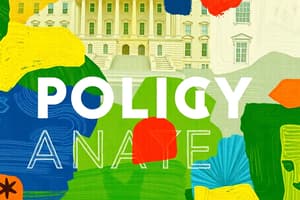Podcast
Questions and Answers
What is the purpose of the continuous comprehensive evaluation process?
What is the purpose of the continuous comprehensive evaluation process?
- To assess course level learning outcomes (correct)
- To maintain a record of extra-curricular activities
- To evaluate the teaching staff's effectiveness
- To find out each student's attendance record
How many questions does Section A of the question paper contain?
How many questions does Section A of the question paper contain?
- 8 questions
- 15 questions
- 5 questions
- 10 questions (correct)
Which section of the question paper contains questions worth 20 marks each?
Which section of the question paper contains questions worth 20 marks each?
- None of the sections
- Section C (correct)
- Section A
- Section B
What is the maximum marks allocated for the entire paper?
What is the maximum marks allocated for the entire paper?
In how many words should the answers to Section B questions not exceed?
In how many words should the answers to Section B questions not exceed?
What is the primary focus of behavioralism in political science?
What is the primary focus of behavioralism in political science?
Which of the following theories explains the origin of the state as a voluntary agreement among individuals?
Which of the following theories explains the origin of the state as a voluntary agreement among individuals?
What concept best describes a state with the duty to promote the welfare of its citizens?
What concept best describes a state with the duty to promote the welfare of its citizens?
In which system of government does the executive derive its authority from being part of the legislature?
In which system of government does the executive derive its authority from being part of the legislature?
Which of these concepts refers to the power a state has to govern itself and make its own policies?
Which of these concepts refers to the power a state has to govern itself and make its own policies?
What distinguishes a federal system from a unitary system of governance?
What distinguishes a federal system from a unitary system of governance?
Which principle is most closely associated with ensuring that government power is divided among separate branches?
Which principle is most closely associated with ensuring that government power is divided among separate branches?
What role do pressure groups primarily play in a political system?
What role do pressure groups primarily play in a political system?
Which of the following concepts refers to fairness and impartial treatment in political contexts?
Which of the following concepts refers to fairness and impartial treatment in political contexts?
Which theory posits that the state emerged gradually through social development and organization?
Which theory posits that the state emerged gradually through social development and organization?
What is one of the key features of the Swiss Constitution?
What is one of the key features of the Swiss Constitution?
Which of the following describes the concept of Democratic Centralism in the Democratic Republic of China?
Which of the following describes the concept of Democratic Centralism in the Democratic Republic of China?
What is a characteristic feature of the French Parliament under the Fifth Republic?
What is a characteristic feature of the French Parliament under the Fifth Republic?
Which body is primarily responsible for executive power in China?
Which body is primarily responsible for executive power in China?
In the context of the French Constitution, the Prime Minister is responsible to which entity?
In the context of the French Constitution, the Prime Minister is responsible to which entity?
What is a fundamental right guaranteed by the French Constitution?
What is a fundamental right guaranteed by the French Constitution?
Which institution plays a vital role in the legislative process in the Democratic Republic of China?
Which institution plays a vital role in the legislative process in the Democratic Republic of China?
Which of the following is NOT a salient feature of the Swiss Federal Assembly?
Which of the following is NOT a salient feature of the Swiss Federal Assembly?
What type of party system exists in France?
What type of party system exists in France?
What is a distinguishing feature of the French Executive?
What is a distinguishing feature of the French Executive?
What issues are included in the major problems facing the Indian political system?
What issues are included in the major problems facing the Indian political system?
Which of the following roles is associated with the Office of the Governor?
Which of the following roles is associated with the Office of the Governor?
What is a common challenge within coalition governments in India?
What is a common challenge within coalition governments in India?
What is a primary function of the Election Commission in India?
What is a primary function of the Election Commission in India?
Which of the following is a significant aspect of India's party system?
Which of the following is a significant aspect of India's party system?
Which problem is NOT considered a major issue in Indian politics?
Which problem is NOT considered a major issue in Indian politics?
What does judicial review allow the Supreme Court to do?
What does judicial review allow the Supreme Court to do?
How does reservation politics operate in India?
How does reservation politics operate in India?
What is a characteristic feature of the working of the parliamentary system in India?
What is a characteristic feature of the working of the parliamentary system in India?
What impact does communalism have on Indian society?
What impact does communalism have on Indian society?
Which of the following is NOT one of the suggested books listed for Hegel and Karl Marx?
Which of the following is NOT one of the suggested books listed for Hegel and Karl Marx?
What is the expected word count limit for the essay on the topic of Marxism?
What is the expected word count limit for the essay on the topic of Marxism?
How many answers are required for the short essay that involves references to three specific points?
How many answers are required for the short essay that involves references to three specific points?
What is the total number of questions that should be prepared for the evaluation?
What is the total number of questions that should be prepared for the evaluation?
Which subject corresponds to Paper 5.5 in Semester VI?
Which subject corresponds to Paper 5.5 in Semester VI?
How long is the duration allocated for the examination of Paper 5.5?
How long is the duration allocated for the examination of Paper 5.5?
Which of the following topics is included in bdkbZ&2?
Which of the following topics is included in bdkbZ&2?
What is the maximum allowable range of words for the short essay on described topics?
What is the maximum allowable range of words for the short essay on described topics?
Flashcards
Continuous Comprehensive Evaluation
Continuous Comprehensive Evaluation
Evaluation that assesses learning outcomes through assignments, tests, seminars, etc.
Introduction to Political Science
Introduction to Political Science
Examines the meaning, scope, and evolution of Political Science.
Traditional vs. Contemporary Political Science
Traditional vs. Contemporary Political Science
Traditional views are older, while contemporary views are modern perspectives.
Theories of the State
Theories of the State
Signup and view all the flashcards
Sovereignty Theories
Sovereignty Theories
Signup and view all the flashcards
Basic Political Science Concepts
Basic Political Science Concepts
Signup and view all the flashcards
Democracy vs. Dictatorship
Democracy vs. Dictatorship
Signup and view all the flashcards
Parliamentary vs. Presidential Systems
Parliamentary vs. Presidential Systems
Signup and view all the flashcards
Unitary vs. Federal Systems
Unitary vs. Federal Systems
Signup and view all the flashcards
Behavioralism in Political Science
Behavioralism in Political Science
Signup and view all the flashcards
Post-Behavioralism
Post-Behavioralism
Signup and view all the flashcards
Power
Power
Signup and view all the flashcards
Authority
Authority
Signup and view all the flashcards
Legitimacy
Legitimacy
Signup and view all the flashcards
Rights
Rights
Signup and view all the flashcards
Liberty
Liberty
Signup and view all the flashcards
Equality
Equality
Signup and view all the flashcards
Justice
Justice
Signup and view all the flashcards
Law
Law
Signup and view all the flashcards
Pressure Groups
Pressure Groups
Signup and view all the flashcards
Minority Representation
Minority Representation
Signup and view all the flashcards
Proportional Representation
Proportional Representation
Signup and view all the flashcards
Organs of Government
Organs of Government
Signup and view all the flashcards
Separation of Powers
Separation of Powers
Signup and view all the flashcards
Good Governance
Good Governance
Signup and view all the flashcards
Globalization
Globalization
Signup and view all the flashcards
Direct Democracy
Direct Democracy
Signup and view all the flashcards
Fundamental Rights
Fundamental Rights
Signup and view all the flashcards
Democratic Centralism
Democratic Centralism
Signup and view all the flashcards
Union Executive, Parliament, and Supreme Court
Union Executive, Parliament, and Supreme Court
Signup and view all the flashcards
Study Notes
Continuous Comprehensive Evaluation
- Continuous comprehensive evaluation assesses course-level learning outcomes through assignments, tests, quizzes, seminars, etc.
- Emphasizes logical thinking, knowledge, and skills acquired during the course.
- Institutions must maintain attendance records for each evaluation method.
Foundations of Political Science (Semester I)
- Course duration: 3 hours, max marks: 120.
- Structure consists of 5 units; question paper has three sections:
- Section A: 20 marks, 10 compulsory questions (2 from each unit); includes multiple-choice and fill-in-the-blank questions.
- Section B: 40 marks, 5 questions (internal choice); answers limited to 150 words.
- Section C: 60 marks, 5 questions (one from each unit); candidates select 3 from different units, answers limited to 400 words.
Unit I
- Introduces Political Science: meaning, nomenclature, and scope.
- Explores traditional vs. contemporary perspectives of Political Science.
- Examines relationships between Political Science and other social sciences (e.g., Economics, History, Sociology).
Unit II
- Discusses theories of the state: Divine Origin, Social Contract, Evolutionary Theory, and Marxist Theory.
- Explains the nature of the state, organic theory, welfare state concept, and sovereignty theories (monistic and pluralistic).
Unit III
- Focuses on basic concepts: Behavioralism and Post-Behavioralism, power, authority, legitimacy, rights, liberty, equality, justice, and law.
Unit IV
- Compares democracy vs. dictatorship, parliamentary and presidential systems, unitary and federal systems.
- Analyzes political parties, pressure groups, minority representation, and proportional representation.
Unit V
- Examines organs of government and their recent trends.
- Discusses the theory of separation of powers, good governance, and globalization.
Suggested Books
- Various foundational texts in Political Science, including works by notable authors like A.C. Kapoor and Andrew Heywood.
Indian Political Thinkers (Semester II)
- Same structure as Semester I with 3-hour duration, max marks: 120.
Unit III
- Studies the Swiss Constitution focusing on direct democracy, Federal Assembly, and Federal Council.
Unit IV
- Analyzes characteristics of the Chinese constitution, fundamental rights, democratic centralism, and the role of the Communist Party.
Unit V
- Discusses the French Fifth Republic's constitution, highlighting fundamental rights, executive roles, the president, and the parliamentary system.
Indian Constitution (Semester IV)
- Course structure remains the same, addressing:
Unit III
- Union executive, parliamentary system, Supreme Court, judicial review, and emergency provisions.
Unit IV
- Office of governors, chief ministers, role of leadership, coalition government, election commission, and electoral reforms.
Unit V
- Major problems in Indian politics including terrorism, linguism, regionalism, communalism, politics of reservation, and the caste system.
Western Political Thinkers & International Relations (Semesters V & VI)
- Focus on key figures in political thought like Hegel and Karl Marx.
- Explore implications and theories in international relations since 1945.
Suggested Literature
- A diverse array of texts encompassing contemporary and classical thoughts in Political Science and international studies.
Studying That Suits You
Use AI to generate personalized quizzes and flashcards to suit your learning preferences.




